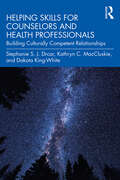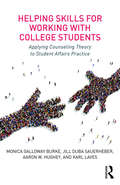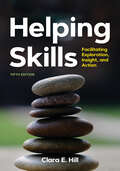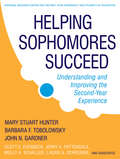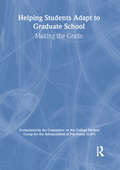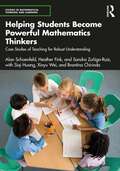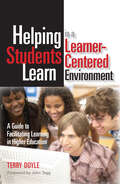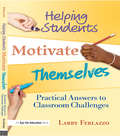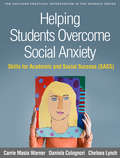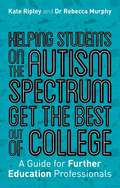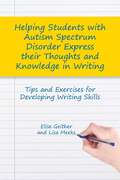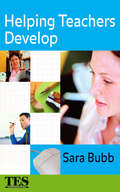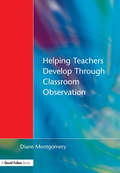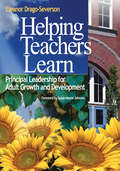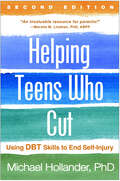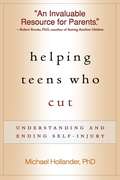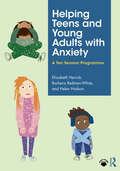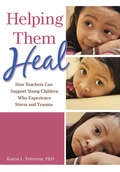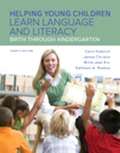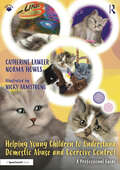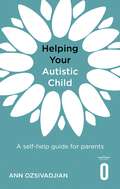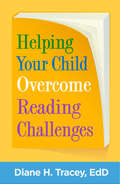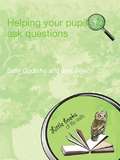- Table View
- List View
Helping Skills for Counselors and Health Professionals: Building Culturally Competent Relationships
by Kathryn C. MacCluskie Stephanie S. Drcar Dakota King-WhiteHelping Skills for Counselors and Health Professionals provides a model of foundational helping skills that is grounded in a multicultural framework. Chapters explicitly examine implicit bias and the role of culture and systems of oppression and marginalization within the lives of both individuals and communities. The text also uses ecological systems theory to assist readers in conceptualizing the ways in which culture influences communication styles, perceptions of professional helpers, and individual needs. Readers will be introduced to concepts that increase awareness of micro and macro-level influences on helping skills, communication, and the patient’s life. Within the book’s multicultural framework, readers will also find tools for increasing self-awareness for improving the communication skills and cultural humility.
Helping Skills for Working with College Students: Applying Counseling Theory to Student Affairs Practice
by Jill Duba Sauerheber Monica Galloway Burke Aaron W. Hughey Karl LavesA primary role of student affairs professionals is to help college students dealing with developmental transitions and coping with emotional difficulties. Becoming an effective helping professional requires the complex integration of intrapersonal, interpersonal, and professional awareness, and knowledge. For graduate students preparing to become student affairs practitioners, this textbook provides the skills necessary to facilitate the helping process and understand how to respond to student concerns and crises, including how to make referrals to appropriate campus or community resources. Focusing on counseling concepts and applications essential for effective student affairs practice, this book develops the conceptual frameworks, basic counseling skills, interventions, and techniques that are necessary for student affairs practitioners to be effective, compliant, and ethical in their helping and advising roles. Rich in pedagogical features, this textbook includes questions for reflection, theory to practice exercises, case studies, and examples from the field.
Helping Skills: Facilitating Exploration, Insight, and Action
by Clara E. HillIn this fifth edition of her best‑selling textbook, Clara Hill presents an updated model of essential helping skills for undergraduate and first‑year graduate students. Hill&’s model consists of three stages—exploration, insight, and action—in which helpers guide clients in exploring their thoughts and feelings, discovering the origins and consequences of maladaptive thoughts and behaviors, and acting on those discoveries to create positive long‑term change. This book synthesizes the author&’s extensive clinical and classroom experience into an easy‑to‑read guide to the helping process. Aspiring helping professionals will learn the theoretical principles behind the three‑stage model and fundamental clinical skills for working with diverse clients. Hill also challenges students to think critically about the helping process, their own biases, and what approach best aligns with their therapeutic skills and goals. New to this edition are: detailed guidelines for developing and revising case conceptualizations, expanded coverage of cultural awareness, updated case examples that reflect greater diversity among clients and helpers, and additional strategies for addressing therapeutic challenges.
Helping Sophomores Succeed
by Schreiner Laurie A. Schaller Molly Pattengale Jerry A. Evenbeck Scott E. Gardner John N. Tobolowsky Barbara F. Hunter Mary StuartHelping Sophomores Succeed offers an in-depth, comprehensive understanding of the common challenges that arise in a student's second year of college. Sponsored by the University of South Carolina's National Resource Center for The First-Year Experience? and Students in Transition, this groundbreaking book offers an examination of second-year student success and satisfaction using both quantitative and qualitative measures from national research findings. Helping Sophomores Succeed serves as a foundation for designing programs and services for the second-year student population that will help to promote retention, academic and career development, and personal transition and growth. Praise for Helping Sophomores Succeed "Lost, lonely, stressed, pressured, unsupported, frequently indecisive, and invisible, many sophomores fall off the radar of campus educators at a time when they may most be seeking purpose, meaning, direction, intellectual challenge, and intellectual capacity building. The fine scholars who focused educators on the first-year and senior transitions have done it again?a magnificent book to focus on the sophomore year!" ?Susan R. Komives, College Student Personnel Program, University of Maryland "For years, student-centered institutions have front-loaded resources to promote student success in the first college year. This volume is rich with instructive ideas for how to sustain this important work in the second year of college. " ?George D. Kuh, Chancellor's Professor and director, Indiana University Center for Postsecondary Research "A pioneering work, this brilliant text explores in practical and meaningful ways the all but neglected sophomore-year experience, when students face critical choices about their major, their profession, their life purpose. " ?Betty L. Siegel, president emeritus, Kennesaw State University? "All members of the campus community?faculty, student affairs educators, staff, and students?will benefit from learning about the unique challenges of the second college year. The book provides research and best practices to help educators and students craft an integrated, comprehensive approach to helping second-year students succeed. " ?Marcia Baxter Magolda, distinguished professor, Educational Leadership, Miami University The National Resource Center for The First-Year Experience? and Students in Transition supports and advances efforts to improve student learning and transitions into and through higher education by providing opportunities for the exchange of practical, theory-based information and ideas.
Helping Staff Develop in Schools
by Peter Earley Sara BubbGreat staff make great schools, and by choosing your staff carefully and helping them to develop, you will make a significant impact on the lives of the young people in your care. The school workforce isn't only teachers these days, and good staff development must take into account everybody working in the setting. As a practical guide to developing your staff, this book offers an inspirational and exciting view of the transformative power of highly motivated personnel. It summarizes the most recent research that sets staff development in context, and then provides examples of good practice and successful ideas from a range of schools, colleges and local authorities. The authors address practical considerations, as well as management and leadership implications, to help devise strategies for developing the school workforce in order to become more learning-centred and student focused. Topics covered include: - why staff development matters - leading staff development - being strategic - finding time for staff development - identifying needs and planning for impact - evaluating the impact of staff development With an emphasis on practical and research-based perspectives, this book offers tried and tested strategies for successful and rewarding staff development that, most importantly, can contribute to improving student outcomes. This book is particularly relevant to those responsible for leading and managing staff development in schools, colleges and at local authority level. It is also useful for anyone working towards higher degrees in Education Leadership and Management, Mentoring-Coaching and the new qualifications for leaders of Continuing Professional Development (CPD) and the Masters in Teaching and Learning (MTL). Sara Bubb is involved in many aspects of staff development, leads the national Advanced Skills Teachers (AST) network, and lectures and researches at the Institute of Education, University of London. Peter Earley is Professor of Educational Leadership & Management at the London Centre for Leadership in Learning, Institute of Education, University of London.
Helping Students Adapt to Graduate School: Making the Grade
by Chairperson Robert L. Arnstein, Md Varda Backus, Md, Chairperson Robert L. Arnste SilberHelp graduate students cope with the pressures of school, finances, family, and professors! In order to succeed in school: The college undergraduate just has to be able to find and operate an elevator in the campus high-rise The master's degree student has to climb the side of the building The PhD student doing research with a professor has to jump over the building in a single bound, carrying the professor That bit of grim humor contains a bitter kernel of truth. Helping Students Adapt to Graduate School is the first book that focuses on the unique problems of graduate students and the best ways to counsel and support them. Graduate and professional schools are draining - emotionally, financially, and physically. In addition to coping with the pressures of classes and high performance expectations, many graduate students juggle multiple lives, trying to please their professors, maintain their status as adults, pay for books and classes and rent and food, keep up a place to live, preserve their marriages, raise their children, and deal with their parents, all while they work as teaching assistants, resident advisors, or research assistants. When adults return to school, they may find themselves forced into a childlike status, causing considerable resentment or regression and sometimes reawakening old conflicts. Furthermore, the relationship of professors and graduate students is often complex and emotionally enmeshed, tinged with issues of respect, rivalry, and even romance. Not surprisingly, many graduate students find the conflicts overwhelming at times. With fascinating case studies and lucid explanations, Helping Students Adapt to Graduate School offers a clear look at the special difficulties of graduate students and practical ways the university can help, including: fostering a sense of belonging providing year-round mental health services helping students handle financial pressures and career decisions supporting the unique needs of minority, international, married, and older students understanding the hidden subtext of faculty-student relationships encouraging a balance of family and school Helping Students Adapt to Graduate School is an essential resource for deans, administrators, professors, and counselors working with graduate students. By illuminating the complex interplay between the university environment and the inner psychological life of graduate students, it will help you provide supportive services to the students in your campus community.
Helping Students Become Powerful Mathematics Thinkers: Case Studies of Teaching for Robust Understanding (Studies in Mathematical Thinking and Learning Series)
by Brantina Chirinda Alan Schoenfeld Heather Fink Sandra Zuñiga-Ruiz Siqi Huang Xinyu WeiThis book supports teacher educators, teachers, coaches, administrators, math-ed faculty, and researchers in understanding and using the Teaching for Robust Understanding (TRU) Framework to improve instruction. Detailed case studies take readers on deep dives into five essential dimensions of classroom practice: The Mathematics; Cognitive Demand; Equitable Access; Agency, Ownership, and Identity; and Formative Assessment. Three case studies form the core of the book. Each case uses the TRU framework to pose conversational questions to the reader on different aspects of the lessons, focusing on the ways that students are led to engage with mathematics and how they make sense of it. These include “What’s important in this classroom episode?,” “What might students be experiencing?,” or “What might the impact of alternative teaching decisions have been in this situation?”. The book concludes with guides for planning, observation, and reflection that readers can use in their own work, continuing the journey toward the ambitious and equitable instruction that each case study describes. This book will support all mathematics educators in developing deeper understandings of mathematics classrooms and in problematizing their own mathematics instruction. By exploring the challenges students face, the decisions teachers make, and the ways that students learn, readers will experience TRU as a powerful way of thinking about instruction – one that can shape lesson planning and reflection and make teaching more impactful and equitable.
Helping Students Learn in a Learner-Centered Environment: A Guide to Facilitating Learning in Higher Education
by Terry DoyleBefore entering higher education, most students’ learning experiences have been traditional and teacher-centered. Their teachers have typically controlled their learning, with students having had little say about what and how to learn. For many students, encountering a learner-centered environment will be new, possibly unsettling, and may even engender resistance and hostility.Taking as his starting point students’ attitudes toward, and unfamiliarity with, learner-centered classrooms, Terry Doyle explains that motivating students to engage with this practice first of all requires explaining its underlying rationale, and then providing guidance on how to learn in this environment. This book is about how to help students acquire the new skills and knowledge they need to take on unfamiliar roles and responsibilities. It is informed by the author’s extensive experience in managing learner-centered classes, and by his consultation work with faculty.The first four chapters focus on the importance of imparting to students the evidence and underlying philosophy that is driving higher education to move from a teacher-centered to a learner-centered practice, and what this means for students in terms of having control over, and making important choices about, their learning. The final eight chapters focus on how to impart the skills that students need to learn or hone if they are to be effective learners in an environment that is new to them. The book covers such practices as learning on one’s own; creating meaningful learning when collaborating with others; peer teaching; making presentations; developing life long learning skills; self and peer evaluation; and give meaningful feedback.This book provides a rich and informative answer to the fundamental question: how do I help my students adjust to a learner-centered practice?
Helping Students Motivate Themselves: Practical Answers to Classroom Challenges
by Larry FerlazzoGive your students the tools they need to motivate themselves with tips from award-winning educator Larry Ferlazzo. A comprehensive outline of common classroom challenges, this book presents immediately applicable steps and lesson plans for all teachers looking to help students motivate themselves. With coverage of brain-based learning, classroom management, and using technology, these strategies can be easily incorporated into any curriculum. Learn to implement solutions to the following challenges: How do you motivate students? How do you help students see the importance of personal responsibility? How do you deal with a student who is being disruptive in class? How do you regain control of an out-of-control class? And more! Blogger and educator Larry Ferlazzo has worked to combine literacy development with short and rigorous classroom lessons on topics such as self-control, personal responsibility, brain growth, and perseverance. He uses many "on-the-spot" interventions designed to engage students and connect with their personal interests. Use these practical, research-based ideas to ensure all of your students are intrinsically motivated to learn!
Helping Students Overcome Social Anxiety: Skills For Academic And Social Success (sass) (The Guilford Practical Intervention In The Schools Series)
by Carrie Masia Warner Daniela Colognori Chelsea LynchSocial anxiety disorder causes significant distress and academic impairment for many adolescents. This unique book gives front-line school professionals innovative, easy-to-use tools for identifying and intervening with socially anxious students in grades 6–12. It presents Skills for Academic and Social Success (SASS), a school-based intervention with demonstrated effectiveness. Case examples and sample scripts demonstrate how to implement psychoeducation, cognitive strategies, social skills training, exposure, and relapse prevention with groups and individual students. In a large-size format with lay-flat binding for easy photocopying, the book includes 22 reproducible handouts. Purchasers get access to a Web page where they can download and print the reproducible materials. This book is in The Guilford Practical Intervention in the Schools Series, edited by T. Chris Riley-Tillman.
Helping Students on the Autism Spectrum Get the Best Out of College: A Guide for Further Education Professionals
by Kate Ripley Rebecca MurphyThis is the companion guide for further education staff working with students on the autism spectrum who are using Getting the Best Out of College for Students on the Autism Spectrum: A Workbook for Entering Further Education.The workbook takes a holistic approach and focusses on the practicalities of college life for autistic students transitioning to further education, as well as those already there. It covers everything needed to support autistic students including getting to college, how to handle new sensory issues, peer relationships, where to go for help, time management, and exam anxiety.This guide follows the structure of the workbook Getting the Best Out of College for Students on the Autism Spectrum. For each chapter, there is a parallel chapter in the student guide that directly addresses the students' needs. This guide includes case studies, contextual information and frameworks to help adults work through the exercises and interactive elements with the student.
Helping Students with Autism Spectrum Disorder Express their Thoughts and Knowledge in Writing: Tips and Exercises for Developing Writing Skills
by Elise Geither Lisa M. MeeksWhen it comes to academic work, students with Autism Spectrum Disorder (ASD) often have the required knowledge but struggle to get their thoughts down in writing. This is a practical guide to teaching and improving writing skills in students with ASD to meet academic writing standards and prepare for the increased expectations of higher education. The book covers key considerations for all educators teaching writing skills to high school and college students with ASD including how to address difficulties with comprehension, executive functioning, and motor skills, how to structure ideas into a coherent argument, and how to develop creativity and expression in writing, as well as how to successfully adapt these skills to meet university expectations. Each chapter includes teaching tips, insightful student perspectives, and ready-to-use writing exercises.
Helping Teachers Develop
by Sara Bubb'Helping Teachers Develop is a positive, uplifting, encouraging publication... very good value for money. It is the sort of publication we need in the profession and it is well worth being part of every head teacher or staff development tutor's collection of really useful books. I have to confess, even before I had finished reading it for review I was using Helping Teachers Develop with my trainee teachers' - Peter Stammers, in the Journal of In-service Education `The book explores ways teachers at all levels can mentor others and improve their careers. [It] also contains guidance on ways to cope with having your lessons observed and how to make constructive comments as an observer' - Michael Shaw, Times Educational Supplement `This is another excellent and accessible practice guide from someone who, unusually, understands both the classroom teacher from long years of practice and the theory. The chapter on "observation of teachers" should be read by every headteacher, deputy and teacher who engages in monitoring classroom practice. Note, a few inspectors would benefit too! It's one to read and then refer to on a regular basis if you work in schools or PGCE departments' - Tim Brighouse, Chief Adviser for London Schools Helping teachers develop - whether they're trainees, newly or recently qualified, in their first three, ten or twenty years, and whether they're superb or struggling - is vital for the profession, for the millions of children who'll learn more as a result. Schools have to take greater responsibility for staff's continuing professional development (CPD) but there is little real help for the people who develop teachers. The best teachers will be expected to mentor trainee and newly qualified teachers (NQTs) and share good practice with all colleagues. Drawing directly on real-life experience and the latest research, this book will help people in a mentoring, coaching, advisory or management role to: o develop teachers, through understanding adult learning and the CPD cycle o meet needs from the range of professional development activities o carry out observations and give oral and written feedback in a range of situations o help and monitor planning and other parts of the job o help teachers develop their careers. Using examples from current practice, Sara will take you though every stage of CPD, from what professional development is to how you can support and monitor staff in your own school. There are photocopiable materials for you to use. The guidance in this book will be essential for mentors, induction tutors, CPD/staff development coordinators, people with advanced skills or excellent teacher status, and all those with a leadership and management role in schools or local authorities. Sara Bubb is the UK's leading induction expert and has vast expertise in the CPD field. She runs many courses for different levels of school staff, assesses trainee and advanced skills teachers and is the new teacher expert for the Times Educational Supplement. Sara has been seconded from the Institute of Education to the DfES as the consultant for the Chartered London Teacher initiative. She is the co-author, with Peter Earley, of Leading and Managing Continuing Professional Development and Managing Teacher Workload.
Helping Teachers Develop through Classroom Observation
by Diane MontgomeryEnhancing the quality of teaching and learning in schools for the benefit of the teacher and pupil is not a matter of quick 'tips for teachers.' It requires a fundamental review by every teacher of his or her own performance and its effects on learners. A significant way of achieving this is by systematic classroom observation and feedback from professional colleagues. This book describes how to set up and engage in classroom observation using well-established professional sampling frames. It illustrates how to use focused appraisal sessions and how to deliver the feedback interview. Underpinning the author's practical guidance is a tried and tested theory of improving teaching and learning for school development and performance management. The approach is practical, positive and supportive and is designed for senior staff, SENCOs, teachers in primary and secondary schools and those taking INSET and CPD courses.
Helping Teachers Learn: Principal Leadership for Adult Growth and Development
by Eleanor Drago-SeversonDrago-Severson presents case studies and examines strategies that help shape a school climate of teacher support, growth, and learning.
Helping Teens Who Cut, Second Edition: Using DBT Skills to End Self-Injury
by Michael HollanderDiscovering that your teen &“cuts&” is every parent's nightmare. Your most urgent question is: "How can I make it stop?" Tens of thousands of worried parents have turned to this authoritative guide for information and practical guidance about the growing problem of teen self-injury. Dr. Michael Hollander is a leading expert on dialectical behavior therapy (DBT), the most effective treatment approach for cutting. Vivid stories illustrate how out-of-control emotions lead some teens to hurt themselves, how DBT can help, and what other approaches can be beneficial. You'll learn practical strategies for talking to teens about self-injury without making it worse, teaching them skills to cope with extreme emotions in a healthier way, finding the right therapist, and helping reduce stress for your whole family. Incorporating the latest research, the second edition offers a deeper understanding of the causes of self-injury and includes new DBT skills.
Helping Teens Who Cut: Understanding and Ending Self-injury
by William Pollack Michael HollanderDiscovering that your teen "cuts" is absolutely terrifying; before you understand what really motivates cutting, you may worry your child is contemplating suicide. What can you do to help when every attempt to address the behavior seems to push him or her further away? In this compassionate, straightforward book, Dr. Michael Hollander, a leading authority on self-injury, spells out the facts about cutting--and what to do to make it stop. You'll learn how overwhelming emotions lead some teens to hurt themselves, and how proven treatments--chief among them dialectical behavior therapy (DBT)--can help your child become well again. Helping Teens Who Cut demonstrates how to talk to your teen about cutting without making it worse, and explains exactly what to look for in a therapist or treatment program. Drawing on decades of clinical experience as well as the latest research, Dr. Hollander provides concrete ways to help your son or daughter cope with extreme emotions without resorting to self-injury. You'll also learn practical communication and problem-solving skills that can reduce family stress, making it easier to care for yourself and your teen during the recovery process.
Helping Teens and Young Adults with Anxiety: A Ten Session Programme
by Elizabeth Herrick Barbara Redman-White Helen HudsonHelping Teens and Young Adults with Anxiety provides a unique structure for a complete ten-week programme, equipping secondary school, college, and university staff with the tools to support students who are experiencing anxiety. Following on from the authors’ best seller Supporting Children and Young People with Anxiety, this companion resource is tailored to meet the complex needs of teenagers and young people and provides a programme which can be run entirely independently. The intervention draws on a range of theoretical backgrounds and practical models of working and reflects recent improved understanding of the neuropsychology of stress and anxiety and an understanding of the effect that trauma can have on the body and mind. Presuming no prior experience on the part of the reader, the authors acknowledge the challenges involved in recognising anxiety and delivering tailored treatment and emphasise the roles of prevention and early intervention. All resources are photocopiable and downloadable and can be easily customised for use with children and parents. Helping Teens and Young Adults with Anxiety provides an eclectic approach to managing anxiety and serves as an important text for education professionals working with young people in both academic and non-academic sectors.
Helping Them Heal: How Teachers Can Support Young Children Who Experience Stress and Trauma
by Karen L. PetersonFrom family instability and poverty to rapid social and technological changes, children endure more stressors than ever before. A young child's brain is uniquely sensitive to the effects of stress and truama, which can have detrimental, long-term developmental impact. Helping Them Heal explains how trauma affects the developing brain, how those changes can manifest in the classroom, and what teachers, and caregivers can do to help a stressed, abused, or neglected child. Helping them Heal provides early childhood educators with answers, ideas, and specific classroom strategies to move trauma-affected children in positive directions. Early childhood educators will learn ways to help children build resilience, self-regulation, and self-competence using this sensitive, supportive, and practical guide.
Helping Young Children Learn Language And Literacy: Birth Through Kindergarten
by James Christie Carol Vukelich Kathleen Roskos Billie EnzHelping Young Children Learn Language and Literacy is about teaching the language arts in a reader-friendly, child-focused way. It provides pre-service and in-service teachers with sound instructional strategies to facilitate children's reading, writing, speaking, and listening development from birth through kindergarten. Each chapter identifies clear learning goals for readers and offers opportunities for self-assessment. <P><P>Recognizing that children are at the heart of good language and literacy teaching, the book focuses on four central themes: a perspective on teaching and learning that blends constructivism and science-based instruction, respect for diversity, instruction-based assessment, and family involvement in literacy learning. <P> The Fourth Edition includes coverage of the Common Core State Standards for English Language Arts, Grades K-12 and contains a number of new features that reflect recent developments in the field of language arts education and that will assist students in learning key concepts and strategies. The Enhanced Pearson eText features embedded videos and assessments.
Helping Young Children to Understand Domestic Abuse and Coercive Control: A Professional Guide (Luna Little Legs: Helping young children to understand domestic abuse and coercive control)
by Nicky Armstrong Catherine Lawler Norma HowesThis guidebook is designed to support professionals with the effective use of the storybook, Luna Little Legs, which has been created help preschool aged children understand about domestic abuse and coercive control. Sensitively and accessibly written, the guidebook presents the adult with comprehensive information regarding domestic abuse and coercive control, and its impact on young children, putting them in a position to have important and informed interactions with the young children in their care. These conversations help children to make sense of their experiences of domestic abuse, giving them the opportunity to vocalise their feelings and to understand what to do when something is not right. Key features of this book include: • Page-by-page notes to support the sensitive reading of the Luna Little Legs story • Accessible information about domestic abuse and coercive control based on the latest research • A comprehensive list of helplines and organisations in place to support adult victims of domestic abuse. This is an essential companion to the Luna Little Legs story, and is crucial reading for anybody working with young children and their families who are experiencing, or have experienced, domestic abuse and coercive control.
Helping Your Autistic Child: A self-help guide for parents (Helping Your Child)
by Ann OzsivadjianPractical, evidence-based advice for managing distressed behaviours and common situations involving autistic children. Autism affects about one per cent of the population, and whilst it can present very differently among individuals, there are some common challenges faced by autistic people. This self-help guide focuses on practical, proven techniques to help parents support their autistic children with commonly experienced areas of difficulty. Written by authors with extensive experience in research and in working clinically with children with a wide range of neurodevelopmental differences, this book uses a strengths-based approach to guide parents in helping their children to enhance their skills, as well as to manage some common challenges.This book will help you to: · Support your child through anxiety and social interaction issues · Manage sleep problems and feeding difficulties · Understand sensory responses in autism · Understand and manage distressed behaviour, including self-harm and demand avoidanceHelping Your Child is a series for parents and caregivers to support children through developmental difficulties, both psychological and physical. Each guide uses clinically proven techniques. Series editors: Dr Polly Waite and Emeritus Professor Peter Cooper
Helping Your Autistic Child: A self-help guide for parents (Helping Your Child)
by Ann OzsivadjianPractical, evidence-based advice for managing distressed behaviours and common situations involving autistic children. Autism affects about one per cent of the population, and whilst it can present very differently among individuals, there are some common challenges faced by autistic people. This self-help guide focuses on practical, proven techniques to help parents support their autistic children with commonly experienced areas of difficulty. Written by authors with extensive experience in research and in working clinically with children with a wide range of neurodevelopmental differences, this book uses a strengths-based approach to guide parents in helping their children to enhance their skills, as well as to manage some common challenges.This book will help you to: · Support your child through anxiety and social interaction issues · Manage sleep problems and feeding difficulties · Understand sensory responses in autism · Understand and manage distressed behaviour, including self-harm and demand avoidanceHelping Your Child is a series for parents and caregivers to support children through developmental difficulties, both psychological and physical. Each guide uses clinically proven techniques. Series editors: Dr Polly Waite and Emeritus Professor Peter Cooper
Helping Your Child Overcome Reading Challenges
by Diane H. TraceyWhen your child struggles with learning to read, it can feel overwhelming. What causes reading difficulties? How can you support your child on the road to a rich and rewarding literacy life? Drawing on her dual expertise as a literacy specialist and a psychotherapist, Diane Tracey takes a unique and holistic approach to supporting children's health and emotional well-being along with their reading skills. In this straightforward, knowledgeable guide, she explains exactly how the reading process works and what you can do to foster literacy development every step of the way. Filled with checklists, fun activities to do with kids, and insightful stories, this compassionate resource gives you tools to help a struggling reader of any age become an avid book lover.
Helping Your Pupils to Ask Questions (Little Books Of Life Skills Ser.)
by Jeni Wilson Sally GodinhoWho? What? When? Where? Why? How? Asking questions has always been fundamental to making sense of the world. Unless we are able to critically question what we see, hear and read, we can‘t solve problems, create solutions, make informed decisions or enact change. And in our information-laden age, it is more important than ever to be able to decide w
